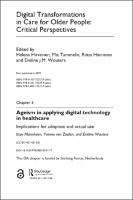Chapter 5 Ageism in applying digital technology in healthcare
Proposal review
Implications for adoption and actual use
Author(s)
Mannheim, Ittay
van Zaalen, Yvonne
Wouters, Eveline J.M.
Language
EnglishAbstract
Digital technology is perceived as a solution to meet the ‘challenges’ of ageing and promote independent and healthy ageing. This approach, often driven by policy makers, is leading to the vast development of a so-called ‘Age-tech’ market, mainly focused on healthcare technologies. Despite the potential positive outcomes, adoption and actual use of digital healthcare technologies are often low, and chronological age is often considered a barrier to the adoption of digital technology. Yet, the role of ageism in adoption and actual use is overlooked. This chapter discusses the potential theoretical influence of ageism in applying digital technology in care and healthcare. First, the chapter provides an overview of the perception of age in relation to digital technology and the manifestation of ageism in healthcare. It continues by providing recent evidence, from the field and from the authors’ research experience, in an attempt to describe two potential ways in which ageism is related to adoption and actual use of digital healthcare technology: 1) through the perspectives of different stakeholders (older adults, healthcare professionals, caregivers and designers) and 2) through the design of digital technology. Finally, the chapter discusses possible implications for practice in healthcare, design, research and policy concerning digital technology.
Keywords
elder care, older people, care, digital agency, digitalization, public health, social services, ageismDOI
10.4324/9781003155317-7ISBN
9780367725570, 9780367725594, 9781003155317Publisher
Taylor & FrancisPublisher website
https://taylorandfrancis.com/Publication date and place
2022Imprint
RoutledgeClassification
Sociology


 Download
Download